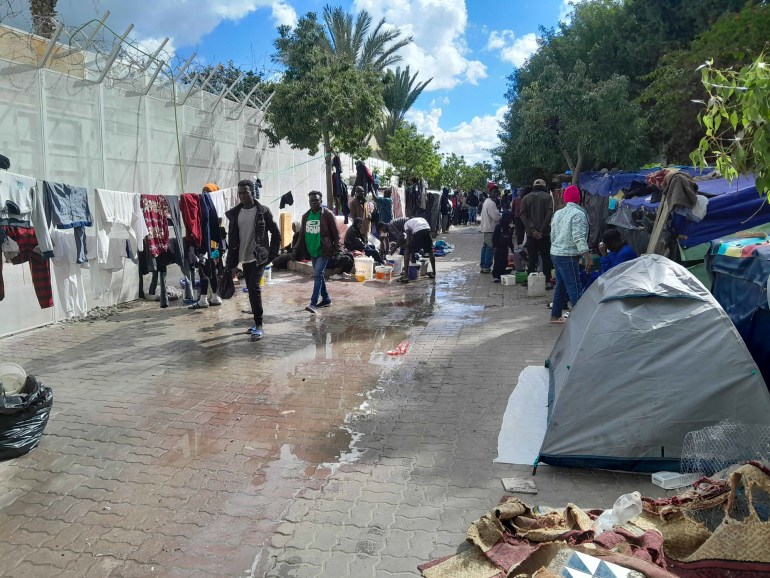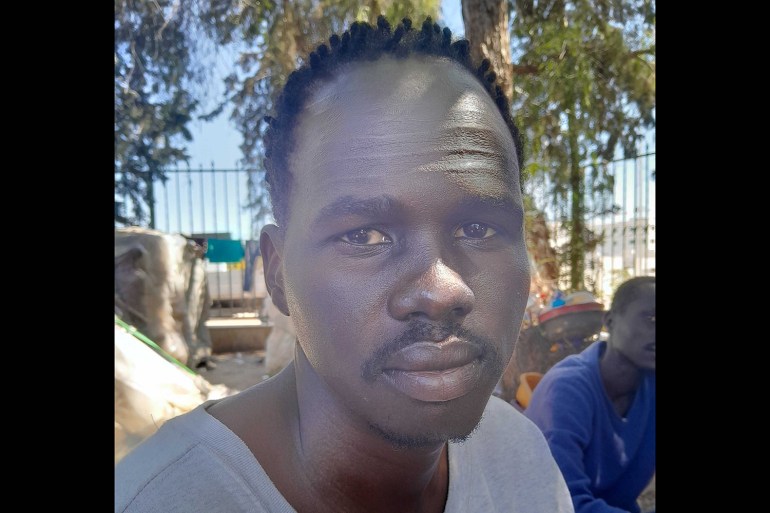Tunis, Tunisia – Thirty-two-year-old Edna Mossay left Freetown, Sierra Leone, along with her 4 youngsters three years in the past.
“It’s not straightforward there. There’s no meals, no medicine, no college,” she stated. “The police used to beat and rape our brothers and sisters. I noticed this.”
Mossay is amongst lots of of 1000’s who flee Sierra Leone yearly to flee corrupt authorities and violent unrest; she now lives in a small tarpaulin and wooden shelter within the micro-shanty city that has shaped exterior the Tunis places of work of the Worldwide Group for Migration (IOM).
She has deliberate her household’s transit to Europe in one of many small, precarious steel boats that carry the poor and determined to Europe.
“The youngsters will value round 1,000 Tunisian dinars [$320]. I’ll pay round 2,500 dinars [$800],” Mossay says hopefully. She is aware of that the nation she is sheltering in has struck offers and acquired funding from Europe to maintain her and other people like her out, however she continues to be prepared to strive.
Conflict of rules and realpolitik?
Mossay’s is a narrative that echoes throughout the IOM tent metropolis and one other encampment the place principally Sudanese refugees and migrants commerce with one another for meals and scraps, and one enterprising younger man sits behind his stitching machine, awaiting prospects.

They’re all fleeing unspeakable horrors, making an attempt to get themselves and household to security, or to assist household again dwelling – people struggling towards a system that’s making an attempt laborious to cease them from getting away.
On the opposing facet of those persecuted, determined folks taking brutal journeys to attempt to attain the rule of regulation promised in Europe are Europe’s personal authorities.
European lawmakers have pitched a latest 7.4 billion-euro ($8bn) deal between the European Union and Egypt as an additional advance on the bloc’s goals to create a buffer zone alongside the shores of the southern Mediterranean, shoring up the partitions of “Fortress Europe”.
With EU parliamentary elections due later this 12 months, and brown and Black arrivals, frequent scapegoats for widespread anger over floundering economies, the European Fee seems intent on putting the problem of migration on the fore.
Europe’s coverage of externalisation, that’s, pushing its border issues again to neighbouring international locations, is just not new.
Since round 2015, when Syria’s collapse resulted in file ranges of migration into Europe, the bloc has actively sought to externalise its migration issues, with its human penalties seemingly an afterthought.
❕This was the second when the EU-funded LCG-302, a ship from Libyan Coast Guards, recklessly maneuvered in entrance of #GeoBarents RHIBS, placing in peril the survivors in addition to @MSF Groups.
Thanks Seabird for retaining watch from the sky!
🎥Karoline Sobel/@seawatch_intl pic.twitter.com/4fuwS82IcU
— MSF Sea (@MSF_Sea) March 17, 2024
“There’s an apparent conflict between what the EU calls its rules and the states it’s coping with alongside the Mediterranean,” Ahlam Chemlali, a researcher in migration and externalisation on the Danish Institute for Worldwide Research stated.
“That conflict can develop extra excessive the additional you journey away from the Mediterranean,” she stated, referring to the place most irregular arrivals originate, reminiscent of war-wracked Sudan, or states reminiscent of Sierra Leone, Nigeria or Mauritania.
Within the final six months, the EU has delivered 305 million euros ($331m) to Tunisia and Egypt – particularly to bolster border protections.
Further reporting over the weekend suggests the full for Tunisia could also be far increased, with 278 million euros ($301m) slated to be channelled to the North African nation over the subsequent three years, with the majority earmarked for safety providers.
That is along with the continuing funding from Italy and the European Union for the Libyan Coast Guard and most of the camps alongside the Libyan coast, which have run since 2017.
‘Fairly intelligent’
This push to maintain the “migration drawback” on the southern shores of the Mediterranean has left refugees and migrants caught within the jaws of militias, human traffickers, North African racism, and authorities who transfer them round to maintain them out of sight, even when it means their deaths in desert border zones.
“Europe should cease seeing its southern neighbourhood as a safety risk and handing energy to warlords and autocrats, in the end with little or no management or oversight.
“It successfully simply serves to provide them management, as they’re in a position to threaten Europe with a wave of migrants each time they wish to extract extra money, or different political concessions from them,” Tarek Megerisi, a senior coverage fellow on the European Council on Overseas Relations, who just lately wrote a paper debunking a lot of the case for externalisation stated.
The EU presently plans to take a position some 150 billion euros ($163bn) in West Africa as a part of its International Gateway bundle, marketed as a bid to create sustainable development and speed up inexperienced and digital transitions.
Italy, below the brand new Mattei Plan, has earmarked 5.5 billion euros ($6bn) to work alongside African efforts to create sustainable initiatives that can anchor potential migrants within the area.
In return, Italian Prime Minister Giorgia Meloni says, Italy will look to put money into Africa’s power business, revitalising its personal economic system and establishing Italy as an power gateway for Europe.
“It’s fairly intelligent, actually,” Megerisi stated, explaining that Meloni’s guarantees of funding in Africa current a progressive entrance ostensibly centered on growth in supply international locations.

“For younger folks, some indication that there could also be an financial future of their nation are actual incentives to stay, given how harmful the choice is,” he stated.
“However with out broader European assist, she is going to fall again on externalisation initiatives like Tunisia, Egypt.”
Nonetheless, as is commonly the case, the satan is within the particulars. Few of the expatriates Al Jazeera spoke to in Tunis had any hope that EU cash granted to governments both locked in civil struggle or subsumed by corruption would draw them again to their international locations of origin.
Thirty-one-year-old Killine Diew from South Sudan, for one, is unconvinced. Requested how his president would react to an identical help bundle as has been granted others, he laughs: “He’ll maintain it!”



